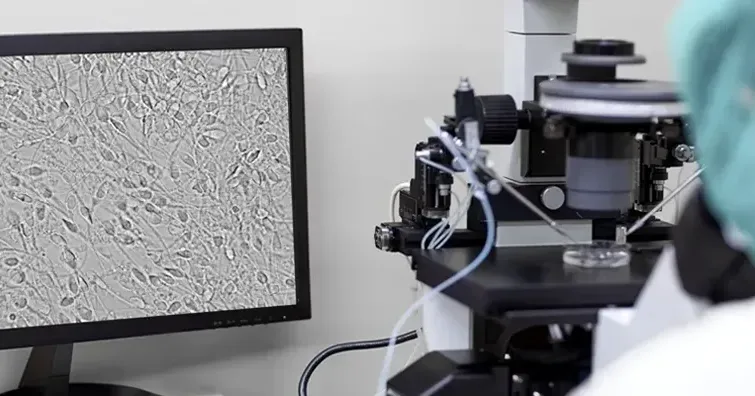
With so many factors that can hinder successful pregnancies, be sure that you’re doing all you can to give your sperm their best chance – including understanding your sperm’s motility.
What Is Sperm Motility?
Motility means the quality or state of being mobile. Sperm motility describes how well a man’s sperm can move. If a person has normal sperm motility, their sperm moves through the female reproductive tract to reach an egg at a normal pace. If a person has low sperm motility, on the other hand, that means their sperm does not move fast enough or far enough to fertilize an egg.
The motility of the sperm cells is an important factor to consider when trying to get pregnant. For a pregnancy to occur, the sperm must be “strong” enough to move through the mucus of the uterine wall, the uterus, and the fallopian tubes before it can reach and fertilize an egg. If your sperm cells can’t complete this journey, you have low sperm motility.
The timeline of a sperm cell’s journey from ejaculation to fertilization can vary greatly. Fast moving healthy sperm can take as little as 30 minutes to reach the egg. A low-motile sperm cell could take multiple days to make the same journey. Considering that sperm can only live in the body for 48-72 hours, this further demonstrates the challenge that low sperm motility can create.
However, it is important to note that there are many factors that can affect male fertility, and sperm motility is just one of them.
The Causes of Low Sperm Motility
There is no one answer for what causes low sperm motility, rather there can be a variety of factors that lead to it. For some, only one factor causes low sperm motility, and for others, there is a combination of factors that have a hand in low sperm motility.
Common causes of low sperm motility include:
- Genetics
- Certain Medical Conditions
- Medication Side Effects
- Lifestyle Factors (Diet/Exercise/Smoking/Drinking)
- Environmental Factors (Proximity to Consistent Radiation/Job Duties)
- Pelvic Trauma
While less common, there are other conditions, disorders, and situational factors that can also be linked to low sperm motility. Consider consulting with a doctor or fertility specialist if you believe you are experiencing issues with low sperm motility, as they can help identify the underlying cause and provide guidance on potential treatment options and necessary lifestyle changes.
How Does Low Sperm Motility Affect Fertility?
Firstly, a man’s sperm motility needs to be measured. To measure sperm motility, a drop of semen is placed on a microscope slide, and the sample is examined. The sperm cells are then classified as either motile or immotile.
Generally, a sperm motility rate of at least 42% (42 out of 100 sperm cells are moving) is considered normal for fertility. The motile cells are further classified based on their speed and of movement. To fall into a normal categorization, 30% of the sperm will need to be deemed to have progressive motility, meaning they are moving in a forward direction.
|
Parameter |
Lower Normal Limit for Fertility |
| Total sperm number (106 per ejaculate) |
39 (35–40) |
| Total motility (%) |
42 (40–43) |
| Progressive motility (%) |
30 (29–31) |
Source: WHO 2021 (https://www.ncbi.nlm.nih.gov/pmc/articles/PMC8706130/)
There are many aspects of sperm health that can affect fertility. The most common cause of male factor infertility is not low sperm motility, but low sperm count. With a low sperm count, rather than the sperm not being able to complete the journey to the egg, there are not enough sperm cells to make the journey.
It is important to recognize that any hindrance to a sperm’s journey to the egg can decrease the odds of successful fertilization. But there are also many instances of conception with low sperm motility.
How to Improve Your Sperm
There are many different things you can do to improve the quality of your sperm if you are concerned about male infertility. However, it is important to note that there can be other factors that affect sperm quality, such as age, genetics, and underlying health conditions. While these tips can be helpful, it is always best to consult with a doctor to come up with a personalized plan of action.
Some lifestyle changes that have the potential to help improve sperm quality include:
1. Maintaining a Proper Diet
Ensuring that you eat a healthy and balanced diet is not only a great habit to pick up in general, but it has also been linked to potential impacts on the motility of sperm. The better you eat and the healthier you are, the healthier your sperm has the potential to be.
Not sure where to start? Try introducing nutrient-rich foods into your diet. Look for foods that are high in antioxidants and vitamins, as they have the potential to benefit sperm count. While there is no one specific food regimen to follow that would increase sperm motility, the overall benefits that come from a proper diet can be a great boost.
2. Keeping An Eye on The Temperature of Your Scrotum
The optimal temperature for sperm production is slightly lower than normal body temperature, which is why the scrotum hangs outside the body. Studies have shown that high temperatures in the scrotum can negatively affect sperm production. Avoiding activities that cause the scrotum to overheat, such as wearing tight pants or taking hot baths, can help maintain optimal temperature and sperm quality.
3. Avoiding Smoking
Studies have shown that heavy alcohol consumption can negatively affect sperm count, motility, and morphology. Smoking and drug use have also been linked to decreased sperm quality. Quitting smoking can improve sperm quality, but it may take several months for the effects to be noticeable.
What is the IVF Success Rate with Low Sperm Motility?
According to one 2022 study, sperm motility is noticeably linked to in vitro fertilization success rates. The study found that in the in vitro setting, sperm motility significantly predicted the fertilization rate, with a statistical accuracy of 71.1%. Or in more simple terms, when sperm motility parameters were used to predict whether fertilization would be successful during IVF, they were correct about 71.1% of the time.
Keep in mind that in vitro fertilization success rates are not dependent on sperm motility alone. Other parameters like embryo quality, low sperm counts, potential sperm DNA fragmentation, and more can also have major affects on IFV success rates. Consulting with a fertility specialist who can assess your specific situation and provide personalized guidance is essential if you have concerns regarding IVF.
How To Check the Quality of Your Sperm
If you’re wondering what your sperm count is, SpermCheck Fertility Test for men is the first step in male fertility testing and an FDA-cleared option that can help get you quick and easy answers in the comfort of your own home.
A man’s sperm count can change over time due to lifestyle, stress levels, and even the weather, so if you’re actively trying to conceive, checking your sperm count every 90 days will help keep you informed on your fertility status. It’s fast, accurate, and convenient… Plus, it’s FSA- and HSA-eligible!
Don’t guess about sperm count—know for sure with this easy fertility test for men. The at-home SpermCheck Fertility Test for men indicates whether a male has low or normal sperm count levels. It works like a home pregnancy test, easy-to-read results are ready in minutes, and best of all, it’s private—no doctor’s visit required!
Knowing your sperm count is a significant first step when properly evaluating your fertility, but you can learn so much more with the help of an additional semen analysis. When you test all key sperm parameters with one of Legacy’s Semen Analysis Kits, you gain insights into semen volume, sperm count, sperm morphology, sperm concentration and more.
Struggling with infertility and need answers?
An at-home sperm test from SpermCheck can help you know your sperm levels and discover the best next step in your fertility journey. Order your SpermCheck Fertility test today.




